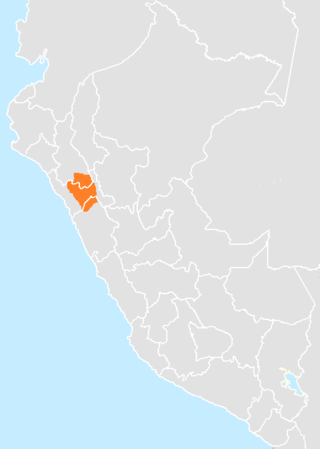| Culle | |
|---|---|
| Culli, Kulyi | |
| Native to | Peru |
| Region | La Libertad, Cajamarca (Cajabamba), Ancash (Pallasca) |
| Extinct | mid-20th century possible speakers in remote villages |
| Language codes | |
| ISO 639-3 | None (mis) |
| Glottolog | cull1235 |
 | |
Culle, also spelled Culli, Cullí, or Kulyi, is a poorly attested extinct language of the Andean highlands of northern Peru. It is the original language of the highlands of La Libertad Region, the south of the Cajamarca Region (Cajabamba), and the north of the Ancash region (Pallasca and Bolognesi[1]). It is known through various word lists collected while the language was still spoken and through vocabulary loaned into the Spanish spoken in the region.[2]
Flores Reyna (1996) reports that Culli was spoken by at least one family in the town of Tauca, Pallasca Province, Ancash region, until the middle of the 20th century. While it appears that Culli has been displaced in its whole range by Spanish, the possibility of speakers remaining in some remote village cannot be ruled out altogether.[3]
Culli was the language spoken in the territory of at least three Pre-Inca cultures or dominions: The kingdom of Konchuko (Conchucos), in the north of the Ancash region; the kingdom of Wamachuko (Huamachuco), in the highlands of La Libertad region; and Culli was spoken at least in the southern part of the kingdom of Kuismanko (Cuismanco), in the south of the Cajamarca region.
Classification
[edit]Because it is poorly attested, it has not been possible to definitively classify Culle.
Jolkesky (2016) also notes that there are lexical similarities with Leco.[4]
Vocabulary
[edit]What little is known of the Culle language consists mostly of vocabulary. A sample list of words is given by Loutkotka (1968); some of these are presented here:[5]
- ahhi – woman
- pič – bird
- čallua – fish
- ču – head
- čukuáll – heart
- mai – foot
- koñ, goñ – water
- kumú – drink
- mú – fire
- sú – sun
- múñ – moon
- urú – tree
- usú – man
A more extensive word list from Loukotka (1949) is given below:[6]
- Notes
- (Sp.) = Spanish loanword (excluded)
- Sources used by Loukotka (1949)
- Manuscript by Martínez Compañón from the 1700s
- Words collected by Paul Rivet in 1934 from Gonzales, a Kulli medicine man in Pallasca, Department of Ancash, Peru
French gloss
(original)English gloss
(translated)Kulli (Martínez Compañón) Kulli (Gonzales) comparisons animal animal (Sp.) arbre tree urú boire drink kumú Kolan: kum chandelle candle nina Kechua: nina bois wood guro bois à brûler firewood pišoče chapeau hat muntua chien dog korep ciel sky (Sp.) cœur heart čukuáll corps body (Sp.) cou neck uro couverture blanket maiko douleur pain pillač eau water koñ goñ étoiles stars čuip Sechura: chúpchúp femme woman ahhi feu fire mú fille daughter ahhi ogóll (see femme) fils son usu ogóll (see homme) fleur flower čučú Hibito: chukchum fleuve river uram frère brother kimit fruit fruit huakohu gai happy kuhi herbe grass paihak chimú: pey homme man usú Katakao: aszat lune moon múñ main hand pui manger eat miú mangeur de pain bread eater huiku-vana mer sea kida mère mother mamá Kechua: mama mort dead koní ohé! hey! čo oiseau bird pičuñ pičon Kechua: pisku ondes waves kóñpulkasú see eau os bone moskár pain bread vana père father kinú pied foot mai pleurer cry akasú Hibito: atzakem pluie rain kau poisson fish čallua Kechua: challua poule chicken guallpe Kechua: atahuallpa rameau branch urú sagars régner reign kankiá sandales sandals maivil see pied sœur sister kañi soleil sun sú terre earth pús tête head ču tronc trunk mukh-kusgá vent wind lluká ventre belly odre viande meat ayča
References
[edit]- ^ Loukotka, Čestmír (1968). Classification of South American Indian languages. Los Angeles: UCLA Latin American Center.
- ^ Adelaar, William F.H.; Pieter C. Muysken (2004). The Languages of the Andes. Cambridge: Cambridge University Press. pp. 401–405. ISBN 0-521-36275-X.
- ^ Adelaar, 1988
- ^ Jolkesky, Marcelo Pinho de Valhery (2016). Estudo arqueo-ecolinguístico das terras tropicais sul-americanas (Ph.D. dissertation) (2 ed.). Brasília: University of Brasília.
- ^ Loukotka, Čestmír (1968). Classification of South American Indian Languages. Los Angeles: UCLA Latin American Center. pp. 63–65.
- ^ Loukotka, Čestmír. 1949. Sur Quelques Langues Inconnues de l'Amerique du Sud. Lingua Posnaniensis I: 53-82.